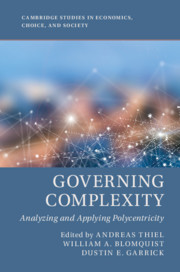Book contents
- Governing Complexity
- Cambridge Studies in Economics, Choice, and Society
- Governing Complexity
- Copyright page
- Contents
- Figures
- Tables
- Boxes
- Contributors
- Acknowledgements
- Introduction
- Part I Foundations for Understanding and Researching Polycentric Governance
- Part II Interactions and Performance in Polycentric Governance
- 5 Cooperation in Polycentric Governance Systems
- 6 Conflict and Conflict Resolution in Polycentric Governance Systems
- 7 Competition in Polycentric Governance Systems
- 8 Assessing Performance of Polycentric Governance System Interactions
- Part III Constituting Polycentric Governance
- Conclusions
- References
- Index
6 - Conflict and Conflict Resolution in Polycentric Governance Systems
from Part II - Interactions and Performance in Polycentric Governance
Published online by Cambridge University Press: 13 September 2019
- Governing Complexity
- Cambridge Studies in Economics, Choice, and Society
- Governing Complexity
- Copyright page
- Contents
- Figures
- Tables
- Boxes
- Contributors
- Acknowledgements
- Introduction
- Part I Foundations for Understanding and Researching Polycentric Governance
- Part II Interactions and Performance in Polycentric Governance
- 5 Cooperation in Polycentric Governance Systems
- 6 Conflict and Conflict Resolution in Polycentric Governance Systems
- 7 Competition in Polycentric Governance Systems
- 8 Assessing Performance of Polycentric Governance System Interactions
- Part III Constituting Polycentric Governance
- Conclusions
- References
- Index
Summary
Polycentric governance systems can promote conflict as overlapping units contest their authorities, roles, and interests, but also provide venues that mitigate conflict. Conflict can lead to learning and institutional adaptation that enhance the functioning of polycentric systems, but conflict can also become entrenched and impede adaptation. Understanding the nature of conflictual interactions in polycentric systems and how those systems provide conflict resolution is critical to understanding performance. This chapter examines conflict and conflict resolution in two polycentric systems that govern hydraulic fracturing and shale development across two US states: Colorado and New York. It examines the extent that conflicts have been resolved and whether learning or adaptation of the governance systems occurred. The chapter considers how the authority, information, and resources of the actors explain incentives for conflict and conflict resolution within the polycentric systems. We observe differences in the conflict interaction patterns, as well as in the performance of polycentric governance in these two settings.
Keywords
- Type
- Chapter
- Information
- Governing ComplexityAnalyzing and Applying Polycentricity, pp. 133 - 151Publisher: Cambridge University PressPrint publication year: 2019
- 6
- Cited by

